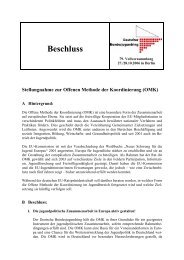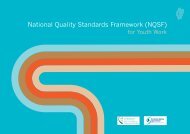6 Country Reports on Youth Work - Jugendpolitik in Europa
6 Country Reports on Youth Work - Jugendpolitik in Europa
6 Country Reports on Youth Work - Jugendpolitik in Europa
Create successful ePaper yourself
Turn your PDF publications into a flip-book with our unique Google optimized e-Paper software.
6.9 Romania<br />
In Romania, the general framework of youth policies is aimed at the young generati<strong>on</strong> as a<br />
whole, and <strong>on</strong>ly specific targeted policies address issues specific to different categories of<br />
young people: Roma youth, girls, students, <strong>in</strong>stituti<strong>on</strong>alised young people, drug c<strong>on</strong>sumers,<br />
HIV positive young people or young people from rural areas. General policy documents and<br />
current Romanian legislati<strong>on</strong> takes the young people as a whole, address<strong>in</strong>g a group rang<strong>in</strong>g<br />
<strong>in</strong> age from 15/16 up to 29 or 35, depend<strong>in</strong>g <strong>on</strong> the policy. “Young families” and n<strong>on</strong>governmental<br />
youth organisati<strong>on</strong> are also a target of the general policy framework. As stated<br />
by the youth policy of the current Romanian government and also the <strong>Youth</strong> Law, the young<br />
generati<strong>on</strong> of people rang<strong>in</strong>g <strong>in</strong> age from 15/16 to 29 or 35 should be supported <strong>in</strong> their<br />
aut<strong>on</strong>omy and <strong>in</strong>dependence. The general view is that the young generati<strong>on</strong> represents a<br />
resource for the future, and this is why its <strong>in</strong>itiatives, its values and attitudes should be<br />
known, its problems solved and itself protected and supported for a better future. But at the<br />
same time, young people are viewed as a vulnerable group that needs protecti<strong>on</strong>, promoti<strong>on</strong><br />
and support. There is a specific policy at nati<strong>on</strong>al level, for example, to support young<br />
families <strong>in</strong> terms of access to hous<strong>in</strong>g or start<strong>in</strong>g a bus<strong>in</strong>ess. There are policies specially<br />
designed to address the needs of special categories of young people: people with<br />
disabilities, members of m<strong>in</strong>ority groups, especially Roma. There is a nati<strong>on</strong>al policy of<br />
encourag<strong>in</strong>g employers to hire young people, especially young graduates; the nati<strong>on</strong>al social<br />
security system offers unemployment benefits equivalent to 50% of the m<strong>in</strong>imum wage to all<br />
high-school and university graduates. In c<strong>on</strong>clusi<strong>on</strong>, we can state that the target groups of<br />
the policies are both special groups of disadvantaged young people as well as this<br />
generati<strong>on</strong> as a whole. The social participati<strong>on</strong> of young people and, c<strong>on</strong>versely, the social<br />
exclusi<strong>on</strong> of some categories are c<strong>on</strong>sidered important youth problems which must be<br />
addressed with measures foster<strong>in</strong>g preventi<strong>on</strong>, political participati<strong>on</strong> of young people,<br />
<strong>in</strong>clusi<strong>on</strong>, and <strong>in</strong>tegrati<strong>on</strong>. To solve these problems, to address the issues of exclusi<strong>on</strong> or<br />
marg<strong>in</strong>alisati<strong>on</strong> or <strong>in</strong>tegrati<strong>on</strong> of young people, the state authorities at every level cooperate<br />
with NGOs <strong>on</strong> these matters, help<strong>in</strong>g them develop programmes and strategies and apply<strong>in</strong>g<br />
together for fund<strong>in</strong>g <strong>in</strong> order to address these issues.<br />
The dom<strong>in</strong>ant c<strong>on</strong>cepts <strong>in</strong> youth work are: participati<strong>on</strong>, especially political and civic<br />
participati<strong>on</strong>, leisure activities such as summer/w<strong>in</strong>ter schools, counsell<strong>in</strong>g for young people<br />
<strong>on</strong> different issues c<strong>on</strong>cern<strong>in</strong>g educati<strong>on</strong>, jobs, travell<strong>in</strong>g, associati<strong>on</strong>s, <strong>in</strong>formati<strong>on</strong>, tra<strong>in</strong><strong>in</strong>g<br />
and voluntary work. Programmes address<strong>in</strong>g issues such as reproductive health and<br />
HIV/Aids preventi<strong>on</strong> have been designed and implemented by several NGOs <strong>in</strong> collaborati<strong>on</strong><br />
with hospitals, cl<strong>in</strong>ics, and medical cab<strong>in</strong>ets at both public and private level. With regard to<br />
the <strong>in</strong>stituti<strong>on</strong>s <strong>in</strong>volved <strong>in</strong> youth work, <strong>in</strong> the last 4-5 years the role of n<strong>on</strong>-governmental<br />
organisati<strong>on</strong>s <strong>in</strong> provid<strong>in</strong>g activities, programmes and projects has gradually been replaced<br />
by a better and broader <strong>in</strong>volvement of nati<strong>on</strong>al authorities both at nati<strong>on</strong>al and regi<strong>on</strong>al/local<br />
level. A network of state <strong>in</strong>stituti<strong>on</strong>s has been built under the coord<strong>in</strong>ati<strong>on</strong> the Nati<strong>on</strong>al<br />
Authority for <strong>Youth</strong>, the central adm<strong>in</strong>istrative body <strong>in</strong> charge of coord<strong>in</strong>at<strong>in</strong>g, design<strong>in</strong>g and<br />
implement<strong>in</strong>g youth policy <strong>in</strong> Romania.<br />
40

















